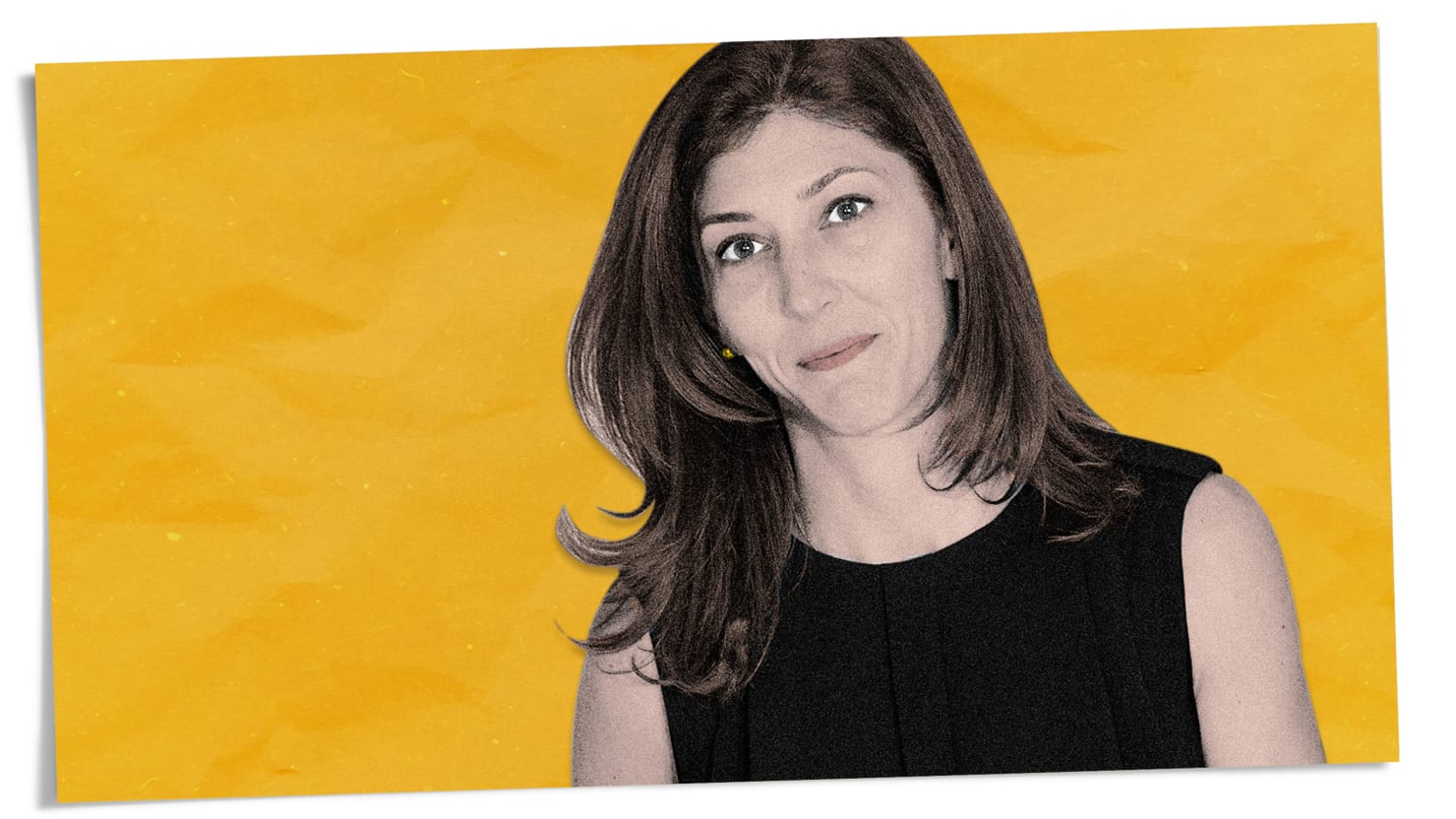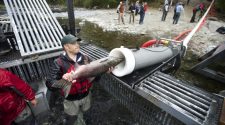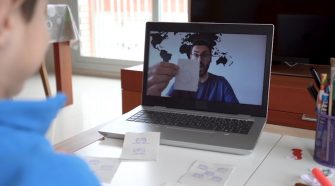It’s not often that you interview a subject who has no interest in being famous. But recently, I did just that when I sat down with Lisa Page the week before Thanksgiving in my hotel room in Washington, D.C. Page, of course, is the former FBI lawyer whose text-message exchanges with agent Peter Strzok that belittled Donald Trump and expressed fear at his possible victory became international news. They were hijacked by Trump to fuel his “deep state” conspiracy.
For the nearly two years since her name first made the papers, she’s been publicly silent (she did have a closed-door interview with House members in July 2018). I asked her why she was willing to talk now. “Honestly, his demeaning fake orgasm was really the straw that broke the camel’s back,” she says. The president called out her name as he acted out an orgasm in front of thousands of people at a Minneapolis rally on Oct. 11, 2019.
That was the moment Page decided she had to speak up. “I had stayed quiet for years hoping it would fade away, but instead it got worse,” she says. “It had been so hard not to defend myself, to let people who hate me control the narrative. I decided to take my power back.”
She is also about to be back in the news cycle in a big way. On Dec. 9, the Justice Department inspector general report into Trump’s charges that the FBI spied on his 2016 campaign will come out. Leaked press accounts indicate that the report will exonerate Page of the allegation that she acted unprofessionally or showed bias against Trump.
How does it feel after all this time to finally have the IG apparently affirm what she’s been saying all along? She said she wouldn’t discuss the findings until they were officially public, but she did note: “While it would be nice to have the IG confirm publicly that my personal opinions had absolutely no bearing on the course of the Russia investigations, I don’t kid myself that the fact will matter very much for a lot of people. The president has a very loud megaphone.”
Page, 39, is thin and athletic. She speaks in an exceedingly confident, clear, and lawyerly way. But having been through the MAGA meat grinder has clearly worn her down, not unlike the other women I’ve met who’ve been subjected to the president’s abuse. She is just slightly crumbly around the edges the way the president’s other victims are.
“My heart drops to my stomach when I realize he has tweeted about me again.”
“It’s almost impossible to describe” what it’s like, she told me. “It’s like being punched in the gut. My heart drops to my stomach when I realize he has tweeted about me again. The president of the United States is calling me names to the entire world. He’s demeaning me and my career. It’s sickening.”
“But it’s also very intimidating because he’s still the president of the United States. And when the president accuses you of treason by name, despite the fact that I know there’s no fathomable way that I have committed any crime at all, let alone treason, he’s still somebody in a position to actually do something about that. To try to further destroy my life. It never goes away or stops, even when he’s not publicly attacking me.”
Does it affect you in your normal day-to-day life?
“I wish it didn’t,” she said. “I’m someone who’s always in my head anyway – so now otherwise normal interactions take on a different meaning. Like, when somebody makes eye contact with me on the Metro, I kind of wince, wondering if it’s because they recognize me, or are they just scanning the train like people do? It’s immediately a question of friend or foe? Or if I’m walking down the street or shopping and there’s somebody wearing Trump gear or a MAGA hat, I’ll walk the other way or try to put some distance between us because I’m not looking for conflict. Really, what I wanted most in this world is my life back.”
Rising Through the Ranks
Lisa Page did not aspire to fame or fortune. She was, she says, “one of those nerdy kids who from very early on knew I wanted work for the government and make the world a better place.” Born in the San Fernando Valley, she and her family moved to Ohio in her teens. She went to American University in Washington, D.C., and then moved back home to central Ohio to attend law school, living with her parents so she could save money.
After graduating from law school, she was one of an elite group selected for admission in the Department of Justice Honors Program in 2006—and the only woman in her class of five entering the Criminal Division. She worked as a federal prosecutor for six years before moving across the street to the FBI’s office of general counsel. Soon after her arrival, the deputy general counsel over national security law hired her for a new special counsel-type position in 2013.
Once there, her path begins to be set.
“I start [in the role] in early 2013, and there are two big events that kind of set the trajectory for the rest of my career at the FBI: the Boston bombing in April 2013, and Edward Snowden’s leaks in June of the same year,” she told me. “And those are both significant in their own ways, because the Boston bombing introduces me to Andy McCabe, who at the time was the head of the counterterrorism division at the FBI. Two months later, the Snowden leaks hit, which became a transformative moment for the intelligence community, setting off a series of reforms by the Obama administration with respect to the legal authorities that we rely on to collect intelligence.”
Eventually, she was asked to lead that effort, “which gives me a lot of exposure to senior FBI executives, as well as leaders through the IC, DOJ, and White House.”
Page continued to rise through the ranks of the FBI and was assigned to more significant and substantive work. She became close with McCabe. Eventually she became McCabe’s special counsel.
Hillary’s Emails and Russia—All At once
By February 2016, she was working on one of the most important investigations at the FBI–the Hillary Clinton email case. “We knew that the case was going to get picked apart,” she says. “And we know there’s not a person on the FBI team or the DOJ team who thinks this is not the right result. There is no case to be brought here. But it’s very busy. It’s very intense. Director [James] Comey was very clear he wanted this completed as soon as humanly possible and outside of the political environment. So there was a real focus to get it done before the conventions that were happening that summer. And so that’s what we did.”
“But her emails” would soon give way to an actual threat to national security, one that existed not in the fever dreams of Fox and the Breitbart comments section, but in the real, dangerous world the FBI exists to protect us from, where things like foreign meddling in our elections takes place: strong evidence of Russian interference in the election on behalf of Trump.
“There are two things that happen in the late summer of 2016,” Page says. “The first, of course, is that the FBI gets the predication [courtesy of loose-lipped George Papadopoulos], which starts the Russian investigation. We learn about the possibility that there’s someone on the Trump campaign coordinating with the Russian government in the release of emails, which will damage the Clinton campaign.”
“Predication” sounds mild for what it really means; in the summer of 2016, the FBI and the intelligence community were seeing increasing signs from a variety of intelligence sources and programs (that Page cannot and will not discuss due to classification reasons) that members of the Trump campaign were tied to a variety of Russian intelligence services, and that the Russian Federation was in the midst of trying to manipulate the 2016 United States election with a sweeping information warfare and propaganda effort. As The New York Times reported on Nov. 22, “U.S. intel services concluded, and have told Senate Republicans, that Russia mounted a massive disinformation campaign to implicate Ukraine in 2016 meddling and hide its own role.”
At the end of July 2016 Page finds herself transitioning from one investigation, the Hillary Clinton email inquiry, to another, the Russian government disinformation probe. The president is not under investigation, but the FBI is trying to determine if someone associated with his campaign is working with Russia.
“We were very deliberate and conservative about who we first opened on because we recognized how sensitive a situation it was,” Page says. “So the prospect that we were spying on the campaign or even investigating candidate Trump himself is just false. That’s not what we were doing.”
From Anonymity to Infamy
From summer 2016 to spring 2017, Page worked for McCabe, who had become deputy director. They were very busy, but things were largely normal. And then, on May 9, 2017, FBI Director Comey was fired. What was that like?
“It was horrible,” Page said. “It was a devastating moment at the FBI. It was like a funeral, only worse, because at least when someone dies, you get to come together and celebrate and talk about that person. He was still alive. But he was inaccessible to us. It jolted the ranks and the investigation. It was so abrupt. He was there one day and gone the next.”
Was that very unusual?
“Well, I mean, all of it was!” she replied. “The FBI director had just been fired. Yes, it was totally within the authority of the president, but it was unprecedented and unimaginable given the circumstances. The president fired him with the knowledge that, of course, we were investigating Russian contacts with his campaign. I mean, it just gave the aura of an obstructive effort.”
Page would have probably just been another FBI lawyer if it wasn’t for the extraordinarily politicized environment and a president who had a habit of attacking career government employees. Page, like many other targets of Trump’s wrath, felt the pressure both from the external force of his massive social media presence, but also from within the government.
“At the end of July in 2017, I am informed by the DOJ Inspector General’s office that I’m under investigation for political text messages and honestly, I have no idea what they’re talking about,” she told me. “I have no recollection. And initially they’re very coy about it. They don’t tell me much about it. I don’t have the first clue what they’re talking about. What I do know is that my text messages will reveal that I had previously had an affair. I’m overwhelmed by dread and embarrassment at the prospect that OIG investigators, Andy, and my colleagues, now know or could learn about this deeply personal secret.”
She doesn’t think for a minute that her texts with Peter Strzok are too political. They are largely devoted to work and to talking about family members and various articles they read. The few texts that so convulsed the Republicans involved Page asking for reassurance that Trump wouldn’t become president, and Strzok replying with “No. No he’s not. We’ll stop it.” Glenn Kessler wrote in The Washington Post that “some of the texts reflect a deep animus toward Trump and the way he conducted himself during the 2016 campaign.”
“Having an opinion and sharing that opinion publicly or privately with another person is squarely within the permissible bounds of the Hatch Act.”
She is convinced that she’s followed the rules. She is after all a lawyer and knows that she is a restricted employee under the Hatch Act and can’t engage in partisan political activity. “And I know I’m nowhere close to that,” she says. “I don’t engage in any sort of partisan politicking at all. But having an opinion and sharing that opinion publicly or privately with another person is squarely within the permissible bounds of the Hatch Act. It’s in the regs. Yeah, it says it plainly. I’m thinking, I know I’m a federal employee, but I retain my First Amendment rights. So I’m really not all that worried about it.”
So she hires a lawyer and meets with the IG, who interviews her a number of times. A very small number of people at the FBI know about the investigation, and it stays a secret for six months, and it remains a secret for six months, until the day after Michael Flynn pleads guilty. Then in early December 2017, the day after Flynn’s plea, a story comes out about Page being under investigation for political bias—and it includes the affair. The affair was not part of IG’s investigation and not part of their review.
The Inspector General’s office had guaranteed Page and Strzok that the affair would not be made public. But then, The Washington Post included the affair in its story. And in a slip of a second, Page goes from being an anonymous government lawyer to playing an unwilling and recurring role in Trump’s twisted tweetstorms.
“So now I have to deal with the aftermath of having the most wrong thing I’ve ever done in my life become public,” she says. “And that’s when I become the source of the president’s personal mockery and insults. Because before this moment in time, there’s not a person outside of my small legal community who knows who I am or what I do. I’m a normal public servant, just a G-15, standard-level lawyer, like every other lawyer at the Justice Department.”
And despite how awful that felt, Page had no idea it was going to get much, much worse.
Trump’s ‘Truly Reprehensible…Stunt’
“After this comes out, there’s a firestorm, of course, and now the president and the Republicans on the Hill latch on to this, and it becomes about political bias,” she explains. “A week or two later, Rod Rosenstein [then the deputy attorney general] was scheduled to testify on the Hill. And the night before his testimony, the Justice Department spokesperson, Sarah Flores, calls the beat reporters into the Justice Department. This is late at night on a weekday. Calls them in to provide a cherry-picked selection of my text messages to review and report on in advance of Rod Rosenstein going to the Hill the next morning.”
Why does she think the administration released her text messages?
“You’d have to ask Sarah Flores,” she says. “I can tell you that the reporters there that night were told that they weren’t allowed to source them to the Justice Department, and that they weren’t allowed to copy or remove them, just take notes. That’s what I know.”
“Those texts were selected for their political impact. They lack a lot of context. Many of them aren’t even about him or me.”
Sarah Isgur Flores has left the administration and referred questions to the Justice Department. The department declined to comment.
As Politico noted at the time, “The DOJ decision to release the text messages to the media and lawmakers before the IG report has drawn criticism from outside the department.” Ben Wittes wrote on the Lawfare blog, “Rosenstein here has, at a minimum, contributed to that circus—at the expense of his own employees. In throwing a career FBI agent and career FBI lawyer to the wolves by authorizing the release to the public of their private text messages—without any finding that they had done anything wrong—he once again sent a message to his workforce that he is not the sort of man with whom you want to share your foxhole.”
Page felt abandoned by the FBI and Justice because of the release of the messages and because the bureau issued no statement defending her and Strzok. “So things get worse,” she continues. “And of course, you know, those texts were selected for their political impact. They lack a lot of context. Many of them aren’t even about him or me. We’re not given an opportunity to provide any context. In a lot of those texts we were talking about other people like our family members or articles we had sent each other.”
I ask her what she did next.
“There’s not really anything to do,” she tells me. “I go back to work. I try to keep my life together.” But she didn’t stay. She left the FBI in May 2018 (which is why she says she is now free to talk to the press—she hasn’t worked for the government for 18 months).
Could she have stayed if she had wanted to? “No, not for much longer. It was very inhospitable.”
Does it feel like a trauma? “It is. I wouldn’t even call it PTSD because it’s not over. It’s ongoing. It’s not a historical event that is being relived. It just keeps happening.”
And it’s still going on? “I mean, he tweeted about me four days ago,” she told me on Nov. 18. “When Roger Stone got convicted, he asked, why isn’t Page in jail too? Not to mention, you know, his truly reprehensible, degrading stunt at his rally, in which he used my name to simulate an orgasm. And I don’t ever know when the president’s going to attack next. And when it happens, it can still sort of upend my day. You don’t really get used to it.”
Watching the Justice Dept. Collapse
She’s not on Twitter, or Facebook, or Instagram or anything, so she relies on a group of her close friends—the support system, along with her husband, that has helped her get through the last two years—to be her alert system.
“I’ll get a text from a friend alerting me to an outrageous tweet by the president and my first question is always—is it about me? Often the answer is yes,” she says.
I ask her about how for about a month back when all this started, Trump called her the “lovely” Lisa Page. She postulates that it’s possible after her congressional testimony that he saw a picture of her. Which makes as much sense as anything in Trumpworld. One thing becomes quickly apparent talking to Page; what really upset her, what still devastates her, was not the end of her extremely promising career at the FBI, but instead what Trump has done to the FBI itself.
“It’s crushing to see the noble Justice Department, my Justice Department, the place I grew up in, feel like it’s abandoned its principles of truth and independence.”
“It’s very painful to see to places like the FBI and the Department of Justice that represent so much of what is excellent about this country, not fulfilling the critical obligation that they have to speak truth to power,” she tells me. “The thing about the FBI that is so extraordinary is that it is made up of a group of men and women whose every instinct is to run toward the fight. It’s in the fiber of everybody there. It’s the lifeblood. So it’s particularly devastating to be betrayed by an organization I still care about so deeply. And it’s crushing to see the noble Justice Department, my Justice Department, the place I grew up in, feel like it’s abandoned its principles of truth and independence.”
Page accepts that her life will never be the same, that there’s no “normal life” to return to. She’s still married to her husband and they have two small children. Ultimately, she was just another public servant like Fiona Hill or Marie Yovanovitch. She was dragged into the spotlight, her text messages weaponized, and her life destroyed so that the Trump administration could have a brief distraction.
The era of Trump populism always had an ugly edge, particularly toward women. Trump revels in bringing misery to his opponents and will always seek out and exploit any weakness. Page “wasn’t nice to him,” and so in his eyes she can be endlessly targeted and assaulted.
It’s tempting to describe this as just part of Trump’s deep, baked-in misogyny and sociopathy, but in Page’s case it’s worse; it’s a sign of how deeply he’s corrupted the government to serve his will and his whims. His apologists have become part of Trump’s own squad of witch-hunters, hunting fantasies like “Ukrainian interference” while attacking the people who tried to protect us from Russian attacks.
It’s not just that Lisa Page may never be safe as long as Trump is president.
It’s that we won’t be safe, either.


















